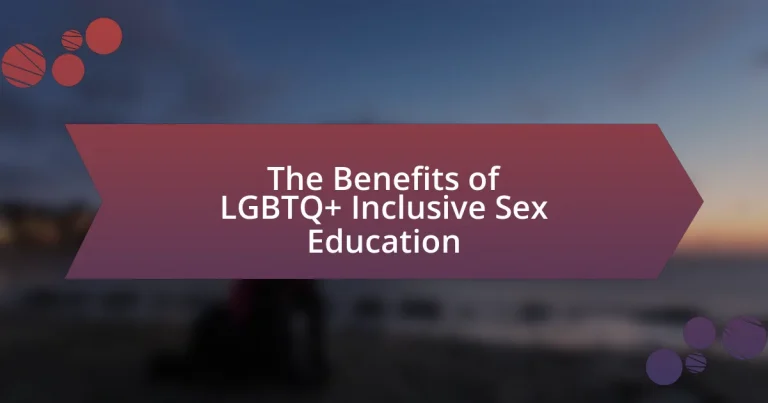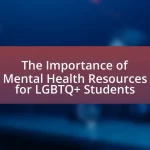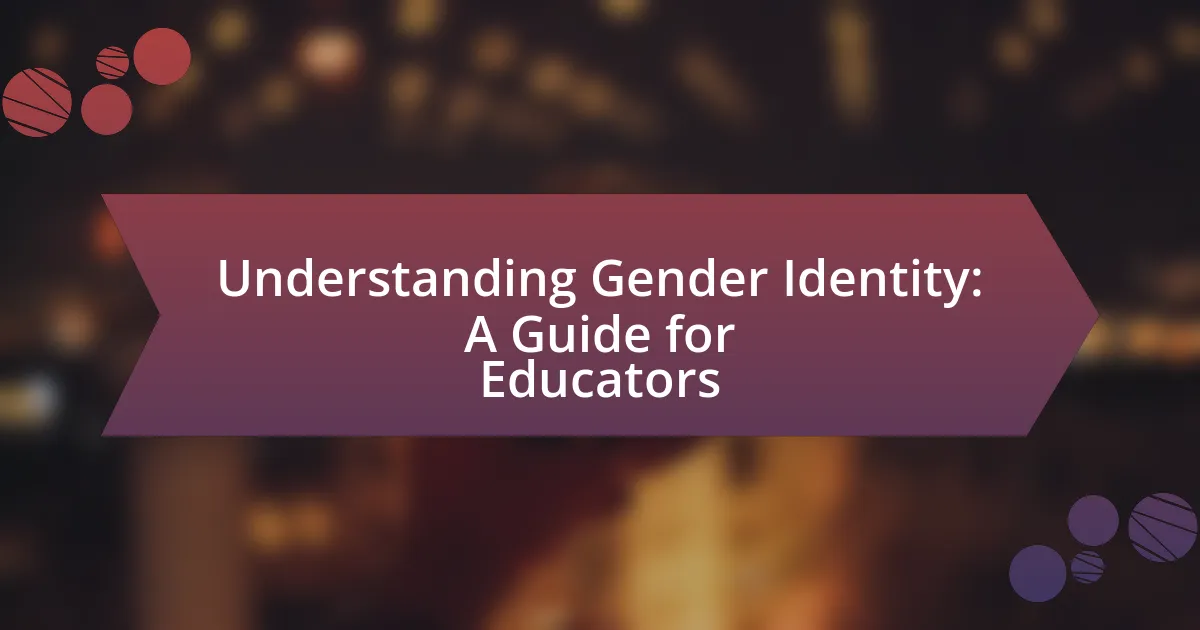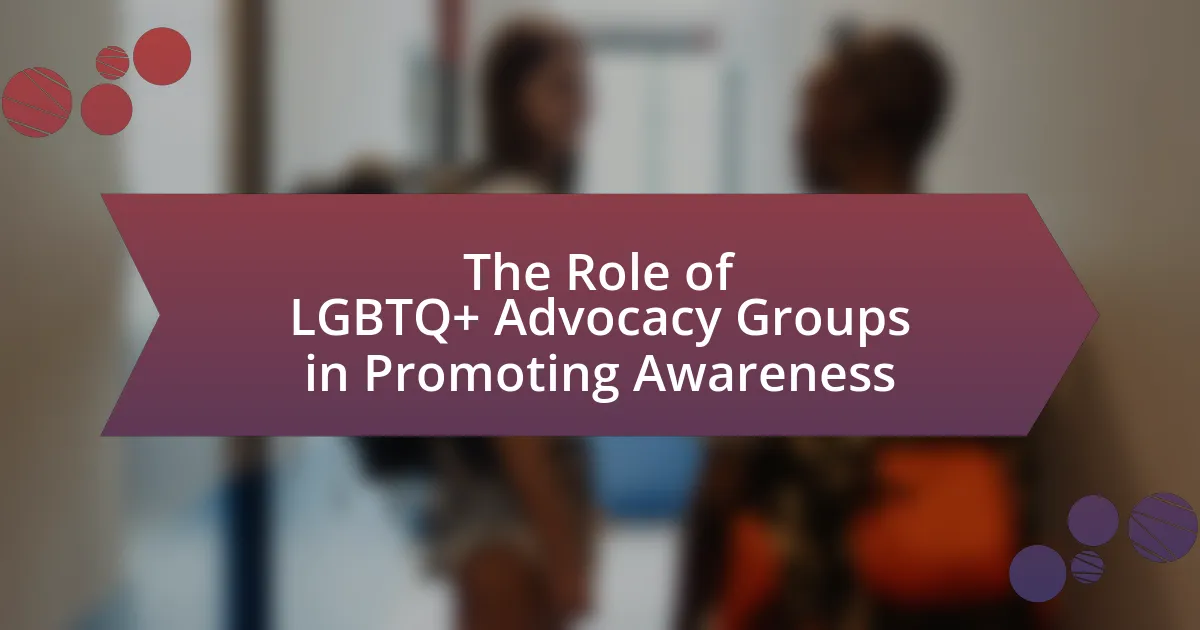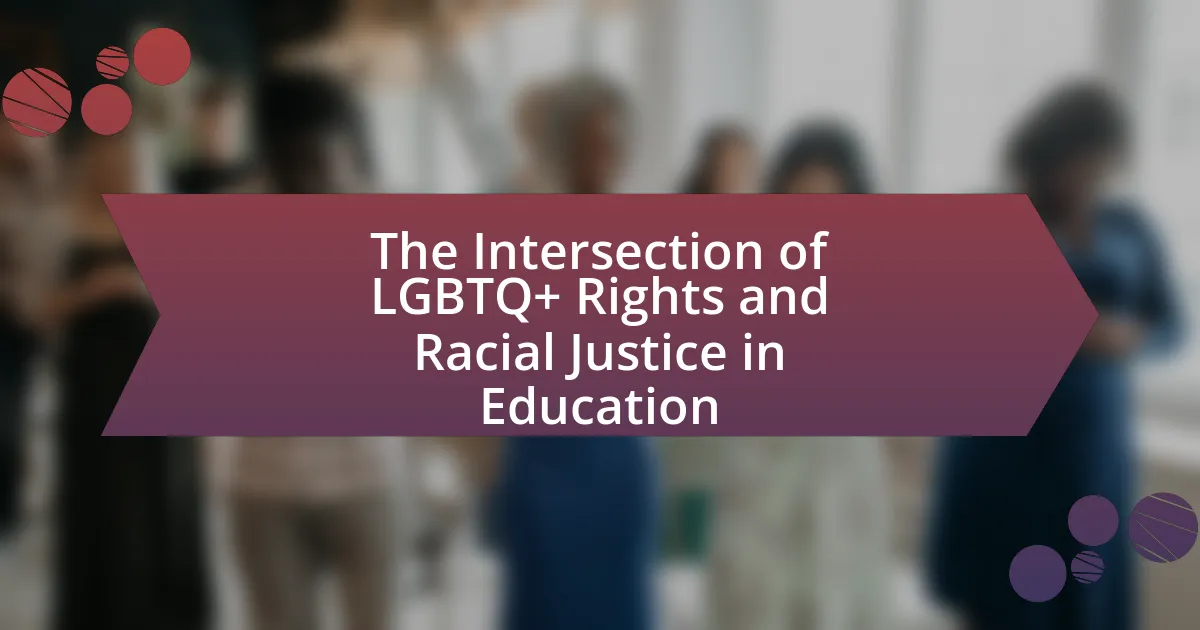LGBTQ+ inclusive sex education is a comprehensive approach that recognizes and addresses the diverse sexual orientations and gender identities of students, aiming to provide accurate information about sexual health, relationships, and consent. This educational model is crucial for fostering understanding, reducing stigma, and creating safe environments for LGBTQ+ youth, who face higher risks of bullying and mental health issues. The article explores the historical context of LGBTQ+ representation in sex education, the differences between inclusive and traditional curricula, and the core principles that guide effective implementation. It also highlights the benefits of inclusive education, including improved mental health outcomes, reduced discrimination, and the promotion of healthy relationships among all students.

What is LGBTQ+ Inclusive Sex Education?
LGBTQ+ inclusive sex education is a comprehensive approach to sexual education that acknowledges and addresses the diverse sexual orientations and gender identities of students. This type of education aims to provide accurate information about sexual health, relationships, and consent while promoting understanding and respect for LGBTQ+ individuals. Research indicates that inclusive sex education can lead to reduced rates of bullying and discrimination, as well as improved mental health outcomes for LGBTQ+ youth, as highlighted in studies by the American Psychological Association.
Why is LGBTQ+ inclusion important in sex education?
LGBTQ+ inclusion is important in sex education because it ensures that all students receive comprehensive and relevant information that reflects their identities and experiences. This inclusion promotes understanding, reduces stigma, and fosters a safe learning environment for LGBTQ+ youth, who are at a higher risk for mental health issues and bullying. Research indicates that inclusive sex education can lead to lower rates of sexually transmitted infections and unintended pregnancies among LGBTQ+ individuals, as it addresses their specific health needs and concerns. Furthermore, studies show that LGBTQ+ inclusive curricula contribute to a more accepting school climate, which benefits all students by promoting respect and empathy.
What are the historical contexts of LGBTQ+ representation in sex education?
LGBTQ+ representation in sex education has evolved significantly over the past several decades, reflecting broader societal changes regarding sexual orientation and gender identity. Historically, sex education in many countries largely excluded LGBTQ+ topics, often reinforcing heteronormative perspectives and stigmatizing non-heterosexual identities. For instance, in the United States, the 1970s saw the emergence of more inclusive approaches, influenced by the gay rights movement, which began advocating for comprehensive sex education that addressed LGBTQ+ issues.
By the 1990s, some educational programs began to incorporate LGBTQ+ content, driven by increased visibility and activism from LGBTQ+ communities. Research from the CDC indicates that inclusive sex education can lead to better health outcomes for LGBTQ+ youth, highlighting the importance of representation in educational curricula. Despite progress, many regions still face resistance, with some states enacting laws that limit or prohibit LGBTQ+ content in sex education, underscoring ongoing challenges in achieving comprehensive representation.
How does LGBTQ+ inclusive sex education differ from traditional sex education?
LGBTQ+ inclusive sex education differs from traditional sex education by explicitly addressing the needs, experiences, and identities of LGBTQ+ individuals. Traditional sex education often focuses primarily on heterosexual relationships and may omit or misrepresent LGBTQ+ topics, leading to a lack of understanding and support for diverse sexual orientations and gender identities. Research indicates that inclusive programs improve the overall sexual health and well-being of LGBTQ+ youth, as they provide accurate information about safe practices, consent, and healthy relationships tailored to their experiences. For example, a study published in the Journal of Adolescent Health found that LGBTQ+ inclusive curricula significantly reduce feelings of isolation and increase feelings of acceptance among LGBTQ+ students.
What are the core principles of LGBTQ+ inclusive sex education?
The core principles of LGBTQ+ inclusive sex education are respect, representation, and relevance. Respect involves acknowledging and valuing diverse sexual orientations and gender identities, fostering an environment where all students feel safe and accepted. Representation ensures that LGBTQ+ experiences and perspectives are included in the curriculum, allowing students to see themselves reflected in the material. Relevance focuses on providing accurate and comprehensive information that addresses the unique needs and concerns of LGBTQ+ individuals, promoting healthy relationships and informed decision-making. These principles are supported by research indicating that inclusive sex education leads to improved mental health outcomes and reduced rates of bullying among LGBTQ+ youth.
What topics should be covered in LGBTQ+ inclusive sex education?
LGBTQ+ inclusive sex education should cover topics such as sexual orientation, gender identity, consent, healthy relationships, safe sex practices, and the diversity of sexual experiences. These topics are essential for fostering understanding and acceptance among students of all identities. Research indicates that inclusive sex education can lead to reduced rates of bullying and discrimination, as well as improved mental health outcomes for LGBTQ+ youth. For instance, a study published in the Journal of Adolescent Health found that comprehensive sex education that includes LGBTQ+ topics significantly decreases the likelihood of suicidal ideation among LGBTQ+ teens.
How can educators create a safe space for LGBTQ+ students?
Educators can create a safe space for LGBTQ+ students by implementing inclusive policies, fostering open dialogue, and providing resources that affirm diverse identities. Inclusive policies, such as anti-bullying measures and non-discrimination clauses, establish a foundation for safety and respect. Open dialogue encourages students to express their identities without fear of judgment, which can be facilitated through training for educators on LGBTQ+ issues. Additionally, providing resources like LGBTQ+ literature and support groups helps students feel represented and supported. Research indicates that schools with inclusive environments see improved mental health outcomes for LGBTQ+ students, highlighting the importance of these practices.

What benefits does LGBTQ+ inclusive sex education provide?
LGBTQ+ inclusive sex education provides numerous benefits, including promoting acceptance and reducing stigma towards diverse sexual orientations and gender identities. This type of education fosters a safe and supportive environment for all students, which has been shown to improve mental health outcomes. Research indicates that LGBTQ+ inclusive curricula can lead to lower rates of bullying and harassment, as evidenced by a study published in the Journal of School Health, which found that schools with inclusive programs reported a 20% decrease in bullying incidents. Additionally, inclusive sex education equips students with comprehensive knowledge about sexual health, relationships, and consent, ultimately leading to healthier behaviors and informed decision-making.
How does it impact the mental health of LGBTQ+ youth?
LGBTQ+ inclusive sex education positively impacts the mental health of LGBTQ+ youth by providing them with accurate information and fostering a sense of belonging. Research indicates that inclusive curricula reduce feelings of isolation and increase self-acceptance among LGBTQ+ individuals. A study published in the Journal of Adolescent Health found that LGBTQ+ youth who received inclusive sex education reported lower levels of depression and anxiety compared to those who did not. This educational approach also promotes understanding and acceptance among peers, which further enhances the mental well-being of LGBTQ+ youth by creating supportive environments.
What evidence supports the positive effects on mental well-being?
Research indicates that LGBTQ+ inclusive sex education positively impacts mental well-being by reducing stigma and promoting acceptance. A study published in the Journal of Adolescent Health found that students who received inclusive sex education reported lower levels of depression and anxiety compared to those who did not. Specifically, the research by Kosciw et al. (2018) demonstrated that inclusive curricula foster a sense of belonging and improve self-esteem among LGBTQ+ youth. Furthermore, the Trevor Project’s National Survey on LGBTQ Youth Mental Health (2021) revealed that inclusive education significantly correlates with lower rates of suicidal ideation among LGBTQ+ individuals. These findings collectively support the assertion that LGBTQ+ inclusive sex education enhances mental well-being.
How does inclusive education reduce stigma and discrimination?
Inclusive education reduces stigma and discrimination by fostering an environment of acceptance and understanding among diverse student populations. This approach encourages interaction and collaboration between students of different backgrounds, including those from LGBTQ+ communities, which helps to normalize diversity and challenge stereotypes. Research indicates that inclusive educational settings lead to improved attitudes towards marginalized groups, as students learn to appreciate differences rather than fear them. For instance, a study published in the Journal of LGBT Youth found that schools implementing inclusive curricula reported lower levels of bullying and harassment, demonstrating a direct correlation between inclusive education and reduced stigma.
What role does it play in promoting healthy relationships?
LGBTQ+ inclusive sex education plays a crucial role in promoting healthy relationships by fostering understanding, respect, and acceptance among diverse sexual orientations and gender identities. This type of education equips individuals with the knowledge and skills necessary to communicate effectively, establish boundaries, and engage in consensual relationships. Research indicates that inclusive sex education reduces stigma and discrimination, leading to improved mental health outcomes and relationship satisfaction among LGBTQ+ youth. For instance, a study published in the Journal of Adolescent Health found that LGBTQ+ inclusive curricula significantly decreased feelings of isolation and increased feelings of belonging, which are essential for forming healthy interpersonal connections.
How does understanding diverse sexual orientations foster empathy?
Understanding diverse sexual orientations fosters empathy by promoting awareness and appreciation of different experiences and identities. When individuals learn about the challenges faced by those with varying sexual orientations, they develop a deeper understanding of the emotional and social struggles that others endure. Research indicates that exposure to diverse perspectives can reduce prejudice and increase compassion, as seen in studies where participants who engaged in discussions about LGBTQ+ issues reported higher levels of empathy towards LGBTQ+ individuals. This understanding not only enhances interpersonal relationships but also contributes to a more inclusive and supportive community.
What skills do students gain for navigating relationships?
Students gain essential skills for navigating relationships, including effective communication, empathy, conflict resolution, and understanding consent. Effective communication enables students to express their feelings and needs clearly, fostering healthier interactions. Empathy allows them to understand and respect diverse perspectives, which is crucial in inclusive environments. Conflict resolution skills equip students to address disagreements constructively, promoting harmony in relationships. Understanding consent is fundamental, as it teaches students the importance of mutual agreement and respect in all interactions. These skills are reinforced through LGBTQ+ inclusive sex education, which emphasizes respect for diversity and healthy relationship dynamics.

How can LGBTQ+ inclusive sex education be implemented effectively?
LGBTQ+ inclusive sex education can be implemented effectively by integrating comprehensive curricula that address diverse sexual orientations and gender identities. This approach involves training educators to deliver content that is affirming and respectful of LGBTQ+ experiences, ensuring that materials reflect the realities of all students. Research indicates that inclusive sex education leads to improved mental health outcomes and reduced rates of bullying among LGBTQ+ youth, as highlighted in the 2016 report by the Gay, Lesbian & Straight Education Network (GLSEN), which found that schools with inclusive curricula reported lower levels of harassment and higher feelings of safety among LGBTQ+ students.
What strategies can educators use to incorporate LGBTQ+ topics?
Educators can incorporate LGBTQ+ topics by integrating inclusive curricula, utilizing diverse teaching materials, and fostering a safe classroom environment. Inclusive curricula should include LGBTQ+ history, literature, and contributions to society, ensuring representation in lesson plans. Diverse teaching materials, such as books and resources featuring LGBTQ+ characters and themes, can enhance understanding and empathy among students. Additionally, fostering a safe classroom environment involves establishing clear anti-bullying policies and encouraging open discussions about gender and sexuality, which research shows can lead to improved mental health outcomes for LGBTQ+ students. Studies indicate that inclusive education reduces stigma and promotes acceptance, benefiting all students.
How can curriculum development be approached for inclusivity?
Curriculum development can be approached for inclusivity by integrating diverse perspectives and experiences, particularly those of LGBTQ+ individuals. This involves incorporating accurate and comprehensive information about sexual orientation and gender identity into educational materials, ensuring that all students see themselves represented in the curriculum. Research indicates that inclusive curricula can lead to improved mental health outcomes for LGBTQ+ youth, as highlighted in the 2016 report by GLSEN, which found that students in schools with inclusive curricula reported lower levels of bullying and higher levels of belonging. Additionally, training educators on inclusivity practices and providing resources that reflect diverse identities can further enhance the effectiveness of the curriculum.
What resources are available for teachers to enhance their knowledge?
Teachers can enhance their knowledge through various resources such as professional development workshops, online courses, educational journals, and LGBTQ+ advocacy organizations. Professional development workshops often provide targeted training on inclusive teaching practices, while online courses from platforms like Coursera or edX offer flexible learning opportunities on LGBTQ+ issues in education. Educational journals, such as the Journal of LGBTQ Youth, publish research and articles that inform educators about best practices and current trends. Additionally, organizations like GLSEN (Gay, Lesbian & Straight Education Network) provide resources, toolkits, and training specifically designed to support LGBTQ+ inclusive education. These resources collectively equip teachers with the necessary knowledge and skills to create inclusive learning environments.
What challenges might educators face in implementing this education?
Educators may face several challenges in implementing LGBTQ+ inclusive sex education, including resistance from parents and community members. This resistance often stems from cultural, religious, or personal beliefs that oppose discussions of LGBTQ+ topics in educational settings. Additionally, educators may encounter a lack of training or resources to effectively teach LGBTQ+ inclusive content, which can hinder their ability to deliver comprehensive education. Research indicates that only 17% of teachers feel adequately prepared to teach LGBTQ+ topics, highlighting a significant gap in professional development (GLSEN, 2019). Furthermore, institutional policies may not support or may actively oppose the inclusion of LGBTQ+ perspectives, creating an environment where educators feel unsupported in their efforts.
How can resistance from parents or communities be addressed?
Resistance from parents or communities can be addressed through open dialogue and education about the benefits of LGBTQ+ inclusive sex education. Engaging parents and community members in discussions that highlight research showing that inclusive education leads to safer environments for all students can help alleviate concerns. For instance, studies indicate that LGBTQ+ inclusive curricula reduce bullying and improve mental health outcomes for LGBTQ+ youth, as noted in the 2016 report by GLSEN, which found that schools with inclusive policies had lower rates of harassment. Providing resources and opportunities for parents to ask questions and express their concerns can foster understanding and acceptance, ultimately leading to greater support for inclusive educational practices.
What support systems can be established for educators?
Support systems that can be established for educators include professional development programs, mentorship initiatives, and access to resources tailored for LGBTQ+ inclusive education. Professional development programs can provide educators with training on LGBTQ+ issues, ensuring they are equipped to create inclusive environments. Mentorship initiatives can connect experienced educators with those new to teaching, fostering a supportive network. Access to resources, such as lesson plans and teaching materials that reflect LGBTQ+ perspectives, can enhance educators’ ability to deliver comprehensive sex education. Research indicates that inclusive training improves educators’ confidence and effectiveness in addressing diverse student needs, ultimately benefiting the learning environment.
What are some best practices for delivering LGBTQ+ inclusive sex education?
Best practices for delivering LGBTQ+ inclusive sex education include using inclusive language, addressing diverse sexual orientations and gender identities, and incorporating accurate information about LGBTQ+ health issues. Inclusive language fosters a safe environment for all students, while addressing diverse identities ensures that the curriculum reflects the experiences of LGBTQ+ individuals. Research indicates that comprehensive sex education that includes LGBTQ+ topics leads to better health outcomes and reduces stigma, as shown in studies by the Guttmacher Institute, which found that inclusive programs improve knowledge and attitudes towards LGBTQ+ individuals.
How can feedback from students improve the curriculum?
Feedback from students can improve the curriculum by providing insights into their learning experiences and needs. When students share their perspectives on what aspects of the curriculum resonate with them or where they face challenges, educators can make informed adjustments to enhance engagement and effectiveness. For instance, research indicates that student feedback can lead to curriculum modifications that better address diverse learning styles and cultural contexts, ultimately fostering a more inclusive educational environment. This is particularly relevant in the context of LGBTQ+ inclusive sex education, where student input can help ensure that the material is relevant, respectful, and supportive of all identities, thereby promoting a more comprehensive understanding of sexual health and relationships.
What ongoing training should educators pursue for effectiveness?
Educators should pursue ongoing training in LGBTQ+ inclusive pedagogy to enhance their effectiveness in teaching sex education. This training equips educators with the knowledge and skills to create a safe and affirming environment for all students, particularly those from LGBTQ+ communities. Research indicates that inclusive sex education improves student engagement and reduces bullying, as highlighted in the 2019 report by the Human Rights Campaign, which found that schools implementing inclusive curricula saw a 30% decrease in harassment incidents. Additionally, ongoing professional development in culturally responsive teaching practices further supports educators in addressing diverse student needs and fostering an inclusive classroom atmosphere.
